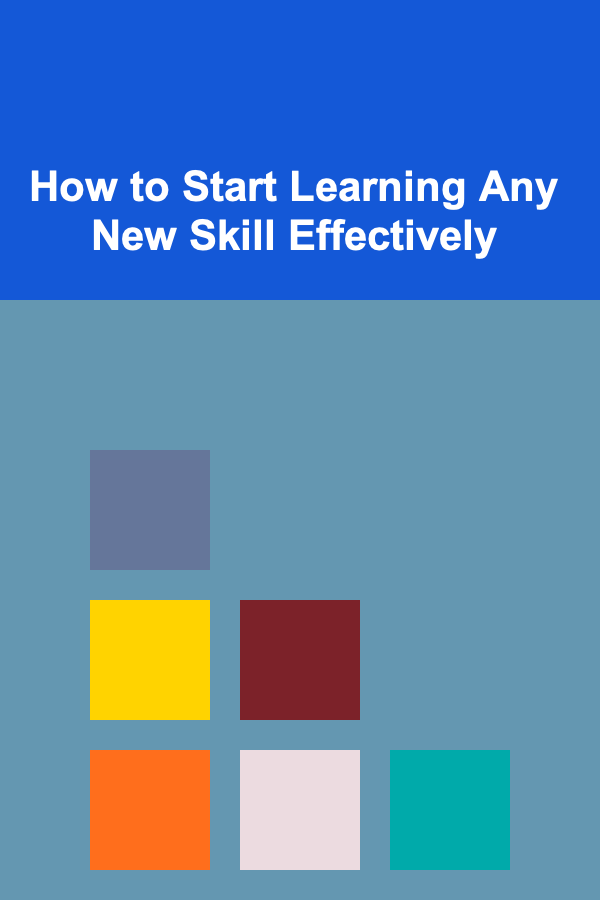
How to Start Learning Any New Skill Effectively
ebook include PDF & Audio bundle (Micro Guide)
$12.99$5.99
Limited Time Offer! Order within the next:

Learning a new skill is an exciting and rewarding journey, whether it's acquiring a foreign language, mastering a musical instrument, or becoming proficient in a professional area like coding or cooking. However, starting a new learning process can be overwhelming. There's often a mountain of information to process, a variety of methods to explore, and a nagging sense of uncertainty. How do you approach learning so that it's not just effective but also enjoyable?
This article explores an effective strategy for learning any new skill, breaking down the steps, tips, and methodologies that will ensure you stay motivated, engaged, and successful.
Set Clear, Specific Goals
Before diving into the skill, it's essential to define what success looks like to you. Having clear, specific, and measurable goals is one of the most important steps in effective learning. Vague goals like "I want to learn to play the guitar" are less motivating than specific ones like "I want to be able to play 5 songs by the end of the month."
The SMART Goals Framework
A good method for setting effective goals is the SMART framework. SMART stands for:
- Specific: Your goal should be clear and precise.
- Measurable: You should be able to track your progress.
- Achievable: The goal should be realistic, not too easy or too difficult.
- Relevant: The goal should align with your larger objectives.
- Time-bound: Set a clear deadline for your goal.
Using the guitar example, a SMART goal would be: "I will learn to play 5 beginner guitar songs within the next month, practicing 30 minutes each day." This goal is clear, measurable, achievable, relevant, and time-bound.
Break Down the Skill into Smaller Tasks
One of the biggest mistakes people make when learning a new skill is trying to learn everything at once. Whether you're learning a new language or programming, the scope can feel overwhelming if you try to master everything in a short period. Instead of tackling everything at once, break the skill down into smaller, manageable tasks.
The Power of Micro-Learning
Micro-learning refers to breaking a skill into smaller, bite-sized chunks and focusing on one chunk at a time. For example, if you're learning to play guitar, your first chunk might be learning the basic chords. Once that's mastered, you can move on to strumming patterns. If you're learning a language, start with common phrases and basic grammar rules before expanding your vocabulary.
Each small task you complete brings you closer to mastering the entire skill, and breaking the skill down can help reduce feelings of overwhelm, making the learning process feel more manageable.
Create a Structured Learning Plan
Once you've set goals and broken the skill into smaller tasks, it's time to create a structured plan. Having a clear plan in place allows you to make steady progress and avoid wasting time. A good learning plan should include a schedule for how much time you will dedicate to each task, a strategy for practice, and a way to track progress.
A Simple Plan Example
Here's an example of how a learning plan might look for someone learning to play the guitar:
- Goal: Learn to play 5 beginner songs within 1 month.
- Time Commitment: 30 minutes of practice per day.
- Week 1: Learn basic chords (C, G, D, A, E).
- Week 2: Practice transitioning between chords smoothly.
- Week 3: Learn to play 2 easy songs using the chords from Week 1.
- Week 4: Learn 3 more songs, incorporating strumming patterns and techniques.
Having a structured plan keeps you focused on what needs to be done next, rather than feeling overwhelmed by the bigger picture.
Use Deliberate Practice
Deliberate practice is the key to mastery. Simply going through the motions of a task without intention or focus won't help you improve. Instead, you need to engage in deliberate practice, which involves working on tasks that are just beyond your current level of competence.
Focus on Weaknesses
When practicing, focus on the areas that are the most challenging for you. If you're learning a new language, you might struggle with pronunciation. Dedicate extra time to this specific aspect until it becomes easier. Similarly, if you're learning guitar, focus on areas where you struggle, such as changing chords smoothly or playing in time.
Deliberate practice also involves regular feedback. This feedback can come from self-assessment, feedback from others, or tracking your progress through specific measurements. For example, after playing a song on the guitar, ask yourself where you struggled and what you can do to improve next time.
Use a Variety of Learning Resources
When starting to learn a new skill, relying on just one source of information can limit your understanding. Different resources offer different perspectives and can help reinforce your learning in various ways.
Explore Multiple Types of Learning Materials
- Books: Reading books gives you deep theoretical knowledge. Books often break down complex concepts and provide a structured approach to learning.
- Online Courses: Platforms like Coursera, Udemy, and Khan Academy offer structured, easy-to-follow courses on virtually any skill.
- Videos and Tutorials: Platforms like YouTube have countless tutorials on everything from playing an instrument to learning a new language.
- Podcasts: Listening to podcasts is a great way to learn during commute times or while doing household chores.
- Practice and Mentorship: Learning through hands-on experience is one of the most powerful ways to learn. Practice the skills you're learning in real-world contexts. If possible, find a mentor or a community that can offer guidance and support.
By diversifying your learning sources, you ensure that you engage with the material from multiple angles, which helps improve retention and deepen your understanding.
Foster Consistency and Discipline
Learning a new skill requires consistent effort over time. It's easy to become excited and motivated at the beginning, but the real challenge comes with maintaining that momentum and sticking to your learning plan over the long term.
Develop Daily Habits
One of the most effective ways to build consistency is to make learning part of your daily routine. Even 15 minutes a day is better than a long, irregular practice session. Set a specific time each day to dedicate to your skill, whether it's in the morning, during lunch, or before bed.
Track Your Progress
Tracking your progress is essential for maintaining motivation. You can keep a journal or use apps that track time and milestones. This will help you see the progress you're making, even when it feels slow. Celebrating small wins can keep you motivated and focused on the bigger picture.
Embrace the Power of Reflection
Reflection is a key element of learning that is often overlooked. After each learning session, take some time to reflect on what you've learned, what worked well, and what could be improved.
Keep a Learning Journal
Journaling your learning process helps consolidate knowledge and identify areas for improvement. It also encourages mindfulness, making you more aware of the challenges and successes you encounter.
Stay Patient and Avoid the Perfection Trap
It's important to stay patient with yourself as you learn. Mastery takes time, and progress is often slower than we'd like. Don't expect to be perfect right away, and don't be discouraged by setbacks. Mistakes are a natural part of the learning process.
Cultivate a Growth Mindset
One of the most crucial elements of effective learning is adopting a growth mindset---the belief that abilities and intelligence can be developed through hard work and dedication. People with a growth mindset view challenges and failures as opportunities to learn and improve.
Learn From Others
No matter what skill you're trying to master, someone else has probably already gone through the same process. Learning from others can provide valuable insights and shortcuts to your own success.
Find a Community
Whether it's an online forum, a local club, or a mentor, connecting with others who are learning the same skill can provide support, motivation, and helpful advice. Engaging with a community can also hold you accountable and expose you to different learning strategies.
Celebrate Milestones and Keep Evolving
As you reach each goal or milestone in your learning process, take a moment to celebrate. Acknowledging your progress reinforces the effort you've put in and boosts motivation for the next phase. Once you reach one goal, set a new one. Keep evolving your skills, and never stop learning.
Final Thoughts
Learning a new skill is not an overnight process---it takes time, patience, and consistent effort. By setting clear goals, breaking the skill into manageable tasks, using a variety of learning resources, maintaining discipline, and embracing a growth mindset, you can master any new skill effectively. The key is to stay motivated, be patient with yourself, and enjoy the process of growth. After all, the journey of learning is just as rewarding as the destination.

How to Curate a Collection of Dining Room Art
Read More
How to Decorate Your Home with DIY Holiday Wall Art
Read More
How to Organize a Family Karaoke Party at Home
Read More
How to Use Online Tutoring Platforms to Make Money
Read More
Why You Should Prioritize Organizing High-Traffic Areas
Read More
How To Connect Your Mind and Body in Yoga
Read MoreOther Products

How to Curate a Collection of Dining Room Art
Read More
How to Decorate Your Home with DIY Holiday Wall Art
Read More
How to Organize a Family Karaoke Party at Home
Read More
How to Use Online Tutoring Platforms to Make Money
Read More
Why You Should Prioritize Organizing High-Traffic Areas
Read More